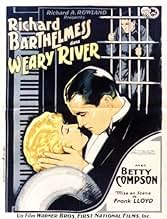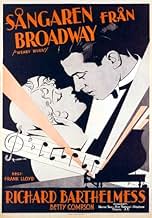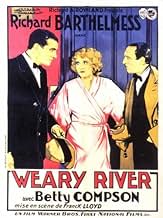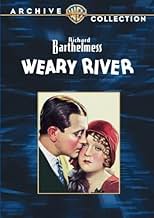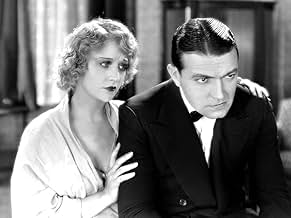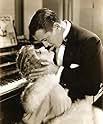Adicionar um enredo no seu idiomaA gangster is put in prison, but finds salvation through music while serving his time. Again on the outside, he finds success elusive and temptations abound.A gangster is put in prison, but finds salvation through music while serving his time. Again on the outside, he finds success elusive and temptations abound.A gangster is put in prison, but finds salvation through music while serving his time. Again on the outside, he finds success elusive and temptations abound.
- Direção
- Roteiristas
- Artistas
- Indicado a 1 Oscar
- 2 vitórias e 1 indicação no total
George E. Stone
- Blackie
- (as George Stone)
Ray Turner
- Elevator Boy
- (as Raymond Turner)
Ernie Adams
- Ex-Con in Alley
- (não creditado)
Brooks Benedict
- Jerry's Guest
- (não creditado)
Ruth Cherrington
- Actress Backstage Who Locks Her Door
- (não creditado)
James Conaty
- Attorney at Trial
- (não creditado)
Richard Cramer
- Prison Radio Announcer
- (não creditado)
Oliver Cross
- Restaurant Patron
- (não creditado)
Edwards Davis
- Prison Chaplain
- (não creditado)
Sally Eilers
- Hatcheck Girl
- (não creditado)
Jim Farley
- Plainclothesman with Sergeant
- (não creditado)
Sherry Hall
- Prison Phone Operator
- (não creditado)
Chuck Hamilton
- Prison Photographer
- (não creditado)
Avaliações em destaque
Frank Lloyd was Oscar nominated for this film & two others, in 1929, about a gangster imprisoned, who becomes a singer...singing endlessly throughout the film the title song.
It's part silent-part talkie...which makes me think that this had been originally shot as a silent and then some portions of it where re-shot with dialogue, a usual thing to be done back in 1929.
A rare chance to watch William Holden, the elderly character actor (no relation to the star of Sunset Boulevard) of late silents and early talkies, who's very, very fine as the warden of the prison, in which gangster Richard Barthelmess is locked up. Barthelmess is good as Jerry Larrabee and Betty Compson (although her voice sounds a little bit high-pitched-maybe due to technical shortcomings)is fine too, as her girlfriend.
Thanks again to TCM, for the opportunity of watching another "rarity", not seen for a long time (completely restored, as best as possible).
It's part silent-part talkie...which makes me think that this had been originally shot as a silent and then some portions of it where re-shot with dialogue, a usual thing to be done back in 1929.
A rare chance to watch William Holden, the elderly character actor (no relation to the star of Sunset Boulevard) of late silents and early talkies, who's very, very fine as the warden of the prison, in which gangster Richard Barthelmess is locked up. Barthelmess is good as Jerry Larrabee and Betty Compson (although her voice sounds a little bit high-pitched-maybe due to technical shortcomings)is fine too, as her girlfriend.
Thanks again to TCM, for the opportunity of watching another "rarity", not seen for a long time (completely restored, as best as possible).
Mostly talkie that's part silent (a goat gland), this film boasts solid performances by the stars: Richard Barthelmess and Betty Compson. He's a small-time gangster who gets framed by a rival and goes to prison. She's the moll with a heart of gold who waits for him.
This early talkie also boasts a few songs, including the wonderful title song sung by Barthelmess (but really Johnny Murray). Not just a gangster picture, this one shows how Barthelmess reforms and goes out into the world only to be called CONVICT at every turn. He almost goes bad again but a visit to the old warden (William Holden) sets him straight. Of course the rival gets bumped off anyway.
This film garnered a lot of bad publicity in 1929 because even though Barthlemss (a major star of his time) signed statements that the singing voice is his, rumor had it he was dubbed. It's obvious he's not singing live but whether the voice is actually his, we may never know. Still, Barthelmess gives a solid performance as does the beautiful Betty Compson (check out those close-ups!)as the loyal friend.
WEARY RIVER may be the first early talkie where there was a controversy over possible dubbing. It almost doesn't matter now, but Barthelmess got caught in a lie, stating he did his own singing when the songs were dubbed by Johnny Murray. Watch this one for Richard Barthelmess and Betty Compson--both early Oscar nominees--in solid performance in a very early talkie.
This early talkie also boasts a few songs, including the wonderful title song sung by Barthelmess (but really Johnny Murray). Not just a gangster picture, this one shows how Barthelmess reforms and goes out into the world only to be called CONVICT at every turn. He almost goes bad again but a visit to the old warden (William Holden) sets him straight. Of course the rival gets bumped off anyway.
This film garnered a lot of bad publicity in 1929 because even though Barthlemss (a major star of his time) signed statements that the singing voice is his, rumor had it he was dubbed. It's obvious he's not singing live but whether the voice is actually his, we may never know. Still, Barthelmess gives a solid performance as does the beautiful Betty Compson (check out those close-ups!)as the loyal friend.
WEARY RIVER may be the first early talkie where there was a controversy over possible dubbing. It almost doesn't matter now, but Barthelmess got caught in a lie, stating he did his own singing when the songs were dubbed by Johnny Murray. Watch this one for Richard Barthelmess and Betty Compson--both early Oscar nominees--in solid performance in a very early talkie.
I am a fan of early talkies.I have seen many but none quite like this.The first reel is silent,the second sound,the third starts off silent then 3 minutes in sound comes in.For the rest of the film,silent and sound constantly interchange.Was this supposed to be an experiment.Was it started as a silent picture.Were they short of sound apparatus some of the time?Why didn't they just make one sound and one silent version?We shall never know.I actuallybfound it quite entertaining even if I got fed up listening to Weary River.
WEARY RIVER (First National Pictures, 1929), a Richard A. Rowland Presentation directed by Frank Lloyd, stars Richard Barthelmess, a popular leading of the silent screen, in this part-silent/part talking 90 minute production produced during the dawn of sound (1927-1929). Regardless of its name, WEARY RIVER is actually a title tune that bears no reference to a river that's weary. While Barthelmess shows great promise that would soon lead to his future in talkies, his singing would not become his forte, considering the fact that his vocalization was reportedly dubbed by another. Basically a crime-melodrama with mix of prison theme and music, WEARY RIVER is quite an entertaining product made entertaining most through its silent orchestral underscoring credited by musical director, Louis Silvers.
Based on the story by Courtney Ryler-Cooper, the plot introduces Jerry Larrabee (Richard Barthelmess), a well-known bootlegger, escorting his steady girlfriend, Alice Gray (Betty Compson) to the Literary Club (for Members only). He soon leaves Alice following a phone call to attend to business regarding Spadoni (Louis Natheaux), a rival gangster gunning for his territory. With an innocent bystander killed during a rumble, Jerry is placed under arrest by his friend (Robert Emmett O'Connor), a police sergeant, accompanied by a detective (James Farley). Jerry stands trial where he is sentenced to serve one to ten years at Laboring Prison. Going under the number of 46039, Jerry becomes a rebellious prisoner until the kindly Warden (William Holden) gives him every chance to change his ways. For Jerry to become a better person, the Warden advises the visiting Alice not to see him again, with the belief that it would be better for Jerry to break all connections with his past. During the course of time, Jerry becomes a songwriter who forms a prison band, broadcasting his latest composition "Weary River," broadcast over the WDCB Radio station, to much success, becoming well known under his new title, "Master of Melody." Upon his prison release for good behavior, Jerry becomes a vaudeville singer vocalizing his signature, "Weary River." Because of his prison record, Jerry finds it difficult adjusting to his new life on the outside, especially with temptation of returning to his life of crime for avenging on the man who framed him. Others featured in the cast are George E. Stone ("Blackie"), Raymond Turner (The Elevator Boy); Gladden James (The Manager); Lee Moran (The Hoofer); and Ernie Adams.
Aside from the tune "Weary River" being vocalized four times and underscored numerously (including during closing exit music) enough for viewers to become song weary before the movie ends, the performance given by Barthelmess and Compson are well acted, even if considered old-style by contemporary viewers. Barthelmess also sings briefly "Frankie and Johnny" along with another tune titled "It's Up to You." Based on the plot summary of a convict becoming a radio singer through broadcast hook-up from the prison, one cannot help but think about a similar themed story of SAY IT WITH SONGS (1929) starring Al Jolson. Had Jolson starred in WEARY RIVER instead, with he singing more songs that the oft-repeated title tune, it would have benefitted his performing style here more than the poorly written and his badly acted performance that has often labeled SAY IT WITH SONGS, regardless of some potential, to be Jolson's worst movie. Interestingly, Frank Lloyd was nominated for an Academy Award for Best Director for this and two other productions, DRAG (with Barthelmess) and THE DIVINE LADY (winner). William Holden (not the famous actor in later years) is commendable as the sympathetic warden while shadowy images of guards leading convict to his execution is well done.
Reportedly WEARY RIVER went through a long and tedious process of restoration in recent years, a challenge that paid off. Unavailable for viewing in decades, and with part-talkies seldom given any sort of revivals since its original release, WEARY RIVER resurfaced intact on Turner Classic Movies (TCM premiere: August 24, 1997), and has become available on DVD for anyone interested in movies during its transformation from silent to sound. (***).
Based on the story by Courtney Ryler-Cooper, the plot introduces Jerry Larrabee (Richard Barthelmess), a well-known bootlegger, escorting his steady girlfriend, Alice Gray (Betty Compson) to the Literary Club (for Members only). He soon leaves Alice following a phone call to attend to business regarding Spadoni (Louis Natheaux), a rival gangster gunning for his territory. With an innocent bystander killed during a rumble, Jerry is placed under arrest by his friend (Robert Emmett O'Connor), a police sergeant, accompanied by a detective (James Farley). Jerry stands trial where he is sentenced to serve one to ten years at Laboring Prison. Going under the number of 46039, Jerry becomes a rebellious prisoner until the kindly Warden (William Holden) gives him every chance to change his ways. For Jerry to become a better person, the Warden advises the visiting Alice not to see him again, with the belief that it would be better for Jerry to break all connections with his past. During the course of time, Jerry becomes a songwriter who forms a prison band, broadcasting his latest composition "Weary River," broadcast over the WDCB Radio station, to much success, becoming well known under his new title, "Master of Melody." Upon his prison release for good behavior, Jerry becomes a vaudeville singer vocalizing his signature, "Weary River." Because of his prison record, Jerry finds it difficult adjusting to his new life on the outside, especially with temptation of returning to his life of crime for avenging on the man who framed him. Others featured in the cast are George E. Stone ("Blackie"), Raymond Turner (The Elevator Boy); Gladden James (The Manager); Lee Moran (The Hoofer); and Ernie Adams.
Aside from the tune "Weary River" being vocalized four times and underscored numerously (including during closing exit music) enough for viewers to become song weary before the movie ends, the performance given by Barthelmess and Compson are well acted, even if considered old-style by contemporary viewers. Barthelmess also sings briefly "Frankie and Johnny" along with another tune titled "It's Up to You." Based on the plot summary of a convict becoming a radio singer through broadcast hook-up from the prison, one cannot help but think about a similar themed story of SAY IT WITH SONGS (1929) starring Al Jolson. Had Jolson starred in WEARY RIVER instead, with he singing more songs that the oft-repeated title tune, it would have benefitted his performing style here more than the poorly written and his badly acted performance that has often labeled SAY IT WITH SONGS, regardless of some potential, to be Jolson's worst movie. Interestingly, Frank Lloyd was nominated for an Academy Award for Best Director for this and two other productions, DRAG (with Barthelmess) and THE DIVINE LADY (winner). William Holden (not the famous actor in later years) is commendable as the sympathetic warden while shadowy images of guards leading convict to his execution is well done.
Reportedly WEARY RIVER went through a long and tedious process of restoration in recent years, a challenge that paid off. Unavailable for viewing in decades, and with part-talkies seldom given any sort of revivals since its original release, WEARY RIVER resurfaced intact on Turner Classic Movies (TCM premiere: August 24, 1997), and has become available on DVD for anyone interested in movies during its transformation from silent to sound. (***).
10glofau
The plot of Weary River is a peculiar amalgam of gangster movie, love story and musical centering around a sensitive hood played by Richard Barthelmess who, after being sent to jail for a crime he didn't commit, discovers his true passion for music and becomes a radio star (based on a true story, believe it or not!). As an entertainment, I give this film 7 out of 10 stars. It's dated but well-paced and amusing without being particularly outstanding.
This review is about Weary River's soundtrack, which is an astonishing achievement for its time but overlooked by film music historians... possibly because the recordings were only rediscovered and restored to the film in 1997.
Film music historians often talk about Max Steiner's 1933 score for King Kong and Franz Waxman's 1934 score for The Bride of Frankenstein as if Steiner and Waxman magically invented synchronized music for film out of thin air... which is preposterous. Due to the success of The Jazz Singer, early talkies were mostly musicals. But it's one thing to have people burst into song in the middle of a scene as if they were on the stage, as in Ernst Lubitsch's superior 1929 film "The Love Parade"... it's something else entirely when the music has to synchronize with action and dialogue over the course of multiple shots and scenes, as in Weary River.
You see, in early talkies, all the sound had to be recorded live simultaneously. If you were going to have music under dialogue, or sound effects, or dialogue looping, it all had to be recorded at the same time. They didn't have multi-track recording in 1929.
Weary River has musical underscoring in virtually every shot of the picture. If you wanted underscoring in 1929, you had to have the orchestra and conductor on the set with the actors. But Weary River has music that flows from silent sequences into talking sequences. To allow that to happen, the composer had to write music for the entire film after they had shot the silent sequences and edited them together but BEFORE they had shot the sound sequences. The composer/conductor (Louis Silvers, who certainly deserved the big screen credit he got for his work) would then have to record all the music for the edited silent sequences. Where the silent and sound sequences were to join together, the conductor would have to record the music to a metronome beat; this would allow the yet-to-be-recorded sound sequence to join seamlessly with the silent sequence musically.
At some point in this process, the composer and director would have to collaborate in order to pre-plan the shot list for the sound sequences... because Weary River has a very sophisticated editing scheme for the visuals. There are a lot of different kinds of shot sequences leading into spoken dialogue. You don't just go from a silent sequence with musical score into a static shot with dialogue on a soundstage. There are many cuts, pieces of business, scene changes, sound effects or synchronized spoken words, all of which had to flow seamlessly into a spoken dialogue exchange in the film with unbroken music playing under it. That means a lot of planning, charts, diagrams. There is nothing spontaneous about the synchronized sound and music of Weary River. It's a choreographed dance of visuals and effects and music and dialogue, all recorded live on a soundstage with actors on a set waiting for their cue. Did they have the conductor in a soundproofed booth with glass windows containing a metronome so that the click didn't get onto the sound track? Did they run edited film behind the orchestra with punches flashing the tempo while the actors waited on the nearby set for their cue to speak? There was clearly one sequence I saw where an actress had to sit with the orchestra and deliver her line in time to her own actions on a film playback which then flowed into a sequence shot live on a set with other actors. This is not a typical early talkie. The fluidity of the shots, and the way the music synchronizes with them and works with the dialogue to create an integrated whole, all recorded in one pass... mind boggling. Things flow together so seamlessly that you don't even realize what you're looking at.
Compare Weary River with a 1929 film like The Vagabond Lover; its shots and music integration are simplistic, static, nothing more than 2 or 3 cameras pointing at a band playing and singing. 1929's The Broadway Melody is exactly the same, primitive camera positions and static shots and nothing very complicated.
Weary River, on the other hand, is a much more sophisticated production... to achieve that fluidity, that seamless integration of music and sound and imagery, required some really extreme measures on the part of the production team given their technical limitations. I'm surprised it's not more highly regarded. In terms of technical achievement, Weary River rates 10 stars.
Unfortunately, the music is not as memorable as King Kong or Bride of Frankenstein. But Weary River makes sound film look like silent film WITH a synchronized musical score and dialogue, which is an amazing feat. Director Frank Lloyd won the Oscar for best director that year, and he deserved it. In 1929, the team at Warner's was the best in the business when in came to sound films, and Weary River is a technical tour de force. You won't see anything more fluid with background music until 1932's groundbreaking Love Me Tonight.
This review is about Weary River's soundtrack, which is an astonishing achievement for its time but overlooked by film music historians... possibly because the recordings were only rediscovered and restored to the film in 1997.
Film music historians often talk about Max Steiner's 1933 score for King Kong and Franz Waxman's 1934 score for The Bride of Frankenstein as if Steiner and Waxman magically invented synchronized music for film out of thin air... which is preposterous. Due to the success of The Jazz Singer, early talkies were mostly musicals. But it's one thing to have people burst into song in the middle of a scene as if they were on the stage, as in Ernst Lubitsch's superior 1929 film "The Love Parade"... it's something else entirely when the music has to synchronize with action and dialogue over the course of multiple shots and scenes, as in Weary River.
You see, in early talkies, all the sound had to be recorded live simultaneously. If you were going to have music under dialogue, or sound effects, or dialogue looping, it all had to be recorded at the same time. They didn't have multi-track recording in 1929.
Weary River has musical underscoring in virtually every shot of the picture. If you wanted underscoring in 1929, you had to have the orchestra and conductor on the set with the actors. But Weary River has music that flows from silent sequences into talking sequences. To allow that to happen, the composer had to write music for the entire film after they had shot the silent sequences and edited them together but BEFORE they had shot the sound sequences. The composer/conductor (Louis Silvers, who certainly deserved the big screen credit he got for his work) would then have to record all the music for the edited silent sequences. Where the silent and sound sequences were to join together, the conductor would have to record the music to a metronome beat; this would allow the yet-to-be-recorded sound sequence to join seamlessly with the silent sequence musically.
At some point in this process, the composer and director would have to collaborate in order to pre-plan the shot list for the sound sequences... because Weary River has a very sophisticated editing scheme for the visuals. There are a lot of different kinds of shot sequences leading into spoken dialogue. You don't just go from a silent sequence with musical score into a static shot with dialogue on a soundstage. There are many cuts, pieces of business, scene changes, sound effects or synchronized spoken words, all of which had to flow seamlessly into a spoken dialogue exchange in the film with unbroken music playing under it. That means a lot of planning, charts, diagrams. There is nothing spontaneous about the synchronized sound and music of Weary River. It's a choreographed dance of visuals and effects and music and dialogue, all recorded live on a soundstage with actors on a set waiting for their cue. Did they have the conductor in a soundproofed booth with glass windows containing a metronome so that the click didn't get onto the sound track? Did they run edited film behind the orchestra with punches flashing the tempo while the actors waited on the nearby set for their cue to speak? There was clearly one sequence I saw where an actress had to sit with the orchestra and deliver her line in time to her own actions on a film playback which then flowed into a sequence shot live on a set with other actors. This is not a typical early talkie. The fluidity of the shots, and the way the music synchronizes with them and works with the dialogue to create an integrated whole, all recorded in one pass... mind boggling. Things flow together so seamlessly that you don't even realize what you're looking at.
Compare Weary River with a 1929 film like The Vagabond Lover; its shots and music integration are simplistic, static, nothing more than 2 or 3 cameras pointing at a band playing and singing. 1929's The Broadway Melody is exactly the same, primitive camera positions and static shots and nothing very complicated.
Weary River, on the other hand, is a much more sophisticated production... to achieve that fluidity, that seamless integration of music and sound and imagery, required some really extreme measures on the part of the production team given their technical limitations. I'm surprised it's not more highly regarded. In terms of technical achievement, Weary River rates 10 stars.
Unfortunately, the music is not as memorable as King Kong or Bride of Frankenstein. But Weary River makes sound film look like silent film WITH a synchronized musical score and dialogue, which is an amazing feat. Director Frank Lloyd won the Oscar for best director that year, and he deserved it. In 1929, the team at Warner's was the best in the business when in came to sound films, and Weary River is a technical tour de force. You won't see anything more fluid with background music until 1932's groundbreaking Love Me Tonight.
Você sabia?
- CuriosidadesThe film is part silent, with intertitles, and part sound, which was important to feature the main character's talent as a singer, although the title song Weary River was nevertheless dubbed by a professional singer. One scene near the end features an orchestra playing on-screen on set that is a radio studio, while traditional silent movie sound is substituted for real sound. Then the scene technology audibly changes to sound recorded on film, with the same orchestra appearing to play for real (possibly dubbed) as the main character begins to sing (although he is listed as dubbed) in a radio performance that prompts his sweetheart to call the radio studio. The scene is an unusual mix of technologies during a period of transition from silents to sound.
- Erros de gravaçãoWhen Jerry Larrabee is brought in to the prison bathroom, there is already an inmate having a bath, who has disappeared before the scene is over.
- Citações
Prison Warden: Oh, I know how you feel. But, things won't be half as bad if you'll only play ball with us.
- Versões alternativasFirst National also released this film in a silent version.
- Trilhas sonorasWeary River
(1929)
Music by Louis Silvers
Lyrics by Grant Clarke
Sung by Richard Barthelmess (dubbed by Johnny Murray)
Principais escolhas
Faça login para avaliar e ver a lista de recomendações personalizadas
Detalhes
- Data de lançamento
- País de origem
- Idioma
- Também conhecido como
- Weary River
- Locações de filme
- Empresa de produção
- Consulte mais créditos da empresa na IMDbPro
- Tempo de duração
- 1 h 26 min(86 min)
- Cor
- Proporção
- 1.33 : 1
Contribua para esta página
Sugerir uma alteração ou adicionar conteúdo ausente

